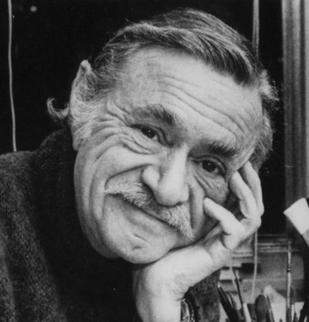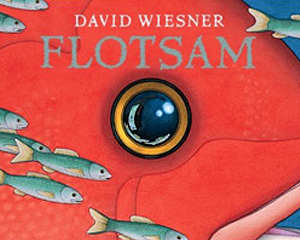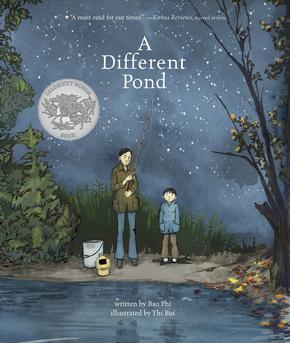
Ezra Jack Keats was an American writer and illustrator of children's books. He won the 1963 Caldecott Medal for illustrating The Snowy Day, which he also wrote. Keats wrote A Letter to Amy and Hi, Cat! but he was most famous for The Snowy Day. It is considered one of the most important American books of the 20th century.

The Boston Globe–Horn Book Awards are a set of American literary awards conferred by The Boston Globe and The Horn Book Magazine annually from 1967. One book is recognized in each of four categories: Fiction and Poetry, Nonfiction, and Picture Book. The official website calls the awards "among the most prestigious honors in children's and young adult literature".

The Snowy Day is a 1962 American children's picture book by American author and illustrator Ezra Jack Keats. It features Peter, an African American boy, who explores his neighborhood after the season's first snowfall. Keats’ illustrations helped pave the way for more inclusive and diverse children's literature. Keats received the 1963 Caldecott Medal for his collage artwork, which made The Snowy Day the first picture book with an African American protagonist to win a major children's award. The book's reception was largely positive, although some critics pointed out subtle stereotypes, such as how Peter's mother was portrayed. Since its publication The Snowy Day has sold millions of copies and has been translated, adapted, and honored leaving a lasting impression on generations of readers.

The Egg Tree is a 1950 book by Katherine Milhous that won the 1951 Caldecott Medal. It is based on the author's family tradition and tells the classic tale of a Pennsylvania Dutch Easter, with its main characters being Katy and Carl. One day, near Easter, they look for Easter eggs and found eggs that their grandmother had painted on a tree. They are interested, so they ask their grandmother about the eggs. They eventually create one, and it becomes a big success the next Easter.

Flotsam is a children's wordless picture book written and illustrated by David Wiesner. Published by Clarion/Houghton Mifflin in 2006, it was the 2007 winner of the Caldecott Medal; the third win for David Wiesner. The book contains illustrations of underwater life with no text to accompany them.

The Girl Who Loved Wild Horses, written and illustrated by Paul Goble, is a children's picture book originally released by Bradbury Press in 1978. It was the recipient of the Caldecott Medal for illustration in 1979. As of 1993, the book has been published by Simon & Schuster.

The Lion & the Mouse is a 2009 nearly wordless picture book illustrated by Jerry Pinkney. This book, published by Little, Brown and Company, tells Aesop's fable of The Lion and the Mouse. In the story, a mouse's life is a spared by a lion. Later, after the lion is trapped, the mouse is able to set the lion free. Adapting the fable, with the moral that the weak can help the strong, as a wordless picture book was seen as a successful way of overcoming the brief plot generally found in the source stories. While it was Pinkney's first wordless picture book, it was not the first time he had told the story, having previously included it in his Aesop's Fables, published in 2000. Pinkney, who had received five Caldecott Honors, became the first African American to win the Caldecott Medal for his illustrations in this book. His illustrations were generally praised for their realism and sense of place. The cover illustrations, featuring the title characters but no text, drew particular praise.

A Sick Day for Amos McGee is a 2010 children's picture book written by Philip C. Stead and was illustrated by Erin E. Stead. The book, published by Roaring Brook Press, depicts a zookeeper who has bonded with the animals he cares for and who come and visit him one day when he gets sick. Phillip Stead wrote the book hoping his wife Erin would illustrate it after a period where she had become discouraged with her art. The book was well reviewed, and Erin won the 2011 Caldecott Medal for her illustrations. The book received praise for its woodblock illustrations and for its message about what friends will do to help and support each other.

A Ball for Daisy is a 2011 children's wordless picture book written and illustrated by Chris Raschka. The book tells the story of a dog named Daisy, who has a beloved ball destroyed and then replaced. Raschka won the 2012 Caldecott Medal for his illustrations in the book. The creation of the book took years but was praised for its ability to evoke emotion in the reader. A sequel, Daisy Gets Lost, was released in 2013.

Goggles! is 1969 children's picture book by American author and illustrator Ezra Jack Keats published by the Penguin Group in 1998. The book is about two boys finding motorcycle goggles. Goggles won a Caldecott Honor in 1970. The illustrations consist of mellow colors created using Keats' signature style of a combination of painting and collage.

This Is Not My Hat is a 2012 American children's picture book by the author and illustrator Jon Klassen. The story is told through the unreliable narration of a little fish, who has stolen a hat from a big fish and how the big fish reacts to the theft. It is a thematic follow-up to I Want My Hat Back (2011) and was meant to be a more literal sequel until Klassen took a suggestion to change which animals were in the story. The book was well received by critics who praised its dark or ironic humor which could only be understood by comparing the words of the little fish's narration against the events of the illustrations. In addition to several positive reviews, Klassen received the 2013 Caldecott Medal and the 2014 Kate Greenaway Medal becoming the first book to win both awards. This is Not My Hat was also a commercial success.

John Henry is a 1994 children's picture book by Julius Lester and illustrated by Jerry Pinkney. It is about the American legendary figure John Henry. In 1998, a 19-minute film adaptation of the book was narrated by Samuel L. Jackson and released by Weston Woods Studios.

Christian Robinson is an American illustrator of children's books and an animator. He is based in Sacramento, California and has worked with The Sesame Street Workshop and Pixar Animation Studios. He graduated from the California Institute of the Arts.

Crown: An Ode to the Fresh Cut is a 2017 picture book by Derrick Barnes, illustrated by Gordon C. James. The book, Barnes' first picture book, is a poem describing a boy's feelings and experience while getting a haircut. James, who was not the first choice to be the illustrator, wanted the oil color illustrations to have the feel of fine art.

A Different Pond is a 2017 children's picture book by Bao Phi, illustrated by Thi Bui. The book tells the story of a boy and his father going fishing. Phi created the book because of his desire to have books about people like himself to read to his daughter. Bui's detailed illustrations allowed Phi to remove elements of the prose. Bui, who had never illustrated a traditional picture book before, won praise for her use of colors and was recognized with a 2018 Caldecott Honor. The book received positive reviews and appeared on best of 2017 book lists.

The Rough Patch is a 2018 picture book by Brian Lies. An idea of Lies' for more than ten years, when it was published it was well received and was named a 2019 Caldecott Honor book. The story tells of a fox named Evan whose dog dies. Evan then experiences various emotions while grieving before adopting a new dog at the end of the book. The book was praised for Lies' mixed media illustrations, in particular the way he used light and shadow.

A Big Mooncake for Little Star is a 2018 picture book written and illustrated by Grace Lin. The story is about Little Star gradually eating the mooncake that her mother has baked. The book was a departure for Lin both thematically and in her use of illustrative style. The book was well reviewed and was awarded a Caldecott Honor. The illustrations feature heavy use of black and rely on both the pictures and words to convey the story and its themes.

Alma and How She Got Her Name is a 2018 children's picture book by Juana Martinez-Neal. Alma, whose full name is Alma Sofia Esperanza José Pura Candela, thinks she has too many names and so she asks her dad about them. He explains the various people she was named to honor. The book was spurred by Martinez-Neal's Peruvian immigrant experience and the birth of her children. The book was well reviewed and a recipient of a 2019 Caldecott Honor for its illustrations. The graphite and colored pencil illustrations feature only a few colors, including blue and pink. Martinez-Neal hoped to evoke the feel of a photo album, in keeping with the book's theme of family.
Oge Mora is a children's book illustrator and author living in Providence, Rhode Island. She received a Caldecott Honor, Coretta Scott King John Steptoe Award for New Talent, and Ezra Jack Keats Book Award in 2019 for her book, Thank You, Omu!.

Bear Came Along is a 2019 picture book by Richard T. Morris and illustrated by LeUyen Pham. It tells the story of a group of animals on a river adventure. Published on June 1, 2019, Bear Came Along was based on memories Morris had of going to overnight camp for the first time. The watercolors, ink, and gouache illustrations Pham created were special for her. Critics wrote about her ability to juggle several different tones through the pictures. These illustrations were also generally seen as complementing the book's theme of being connected to others. The book was generally well reviewed and it received a 2020 Caldecott honor.



















